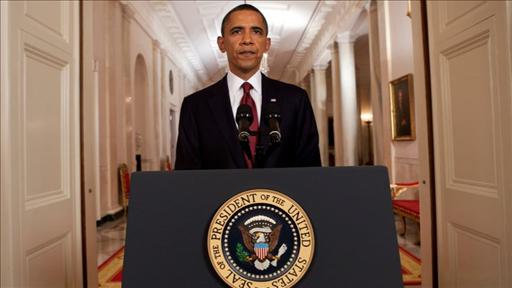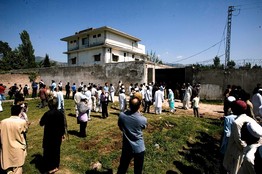From Guantanamo to Abbottabad
The bin Laden mission benefited greatly from Bush administration interrogation policies, but President Obama still prefers to kill, rather than capture, terrorists. This costs valuable intelligence.
By John Yoo
WSJ.com
In the space of 40 minutes on Sunday
night, two Navy SEAL teams descended on a
compound in Abbottabad, Pakistan, and killed
the fugitive leader of al Qaeda. They
brought a rough measure of justice to the
man responsible for the killing of 3,000
Americans on Sept. 11, 2001 and thousands of
others in countries from Spain to Iraq.
Credit goes to the armed forces, which
executed the operation; the intelligence
agencies, which found the target; and the
Obama administration, which approved it.
Sunday's success also vindicates the Bush administration, whose intelligence architecture marked the path to bin Laden's door. According to current and former administration officials, CIA interrogators gathered the initial information that ultimately led to bin Laden's death. The United States located al Qaeda's leader by learning the identity of a trusted courier from the tough interrogations of Khalid Sheikh Mohammed, the architect of the 9/11 attacks, and his successor, Abu Faraj al-Libi.
Armed with the courier's
nom de guerre,
American intelligence agencies later found
him thanks to his phone call to a contact
already under electronic surveillance. Last
August, the courier traveled to bin Laden's
compound, but it took another eight months
before the CIA became certain that the al
Qaeda leader was hiding inside.
President George W. Bush, not his successor, constructed the interrogation and warrantless surveillance programs that produced this week's actionable intelligence. For this, congressional Democrats and media pundits pilloried him for allegedly exceeding his presidential powers and violating the Bill of Rights.
As a candidate in 2008, then-Sen. Obama
held Mr. Bush and Sen. John McCain
"responsible for the most disastrous set of
foreign policy decisions in the recent
history of the United States." These
decisions, he said, allowed bin Laden and
his circle to establish "a safe-haven in
northwest Pakistan, where they operate with
such freedom of action that they can still
put out hate-filled audiotapes to the
outside world."
Upon taking office, Mr. Obama tried to
fulfill the dreams of the antiwar left. In
January 2009, he signed executive orders to
close the prison at Guantanamo Bay and limit
the CIA to U.S. military interrogation
methods. He made it clear that al Qaeda
leaders would be tried in civilian courts.
And in August 2009, his attorney general,
Eric Holder, launched a criminal
investigation into CIA officers who had
interrogated al Qaeda leaders.
Imagine what would have happened if the
Obama administration had been running things
immediately following 9/11. After their
"arrest," we would have read KSM and al-Libi
their Miranda rights, provided them legal
counsel, sent them to the U.S. for
detention, and granted them all the rights
provided a U.S. citizen in criminal
proceedings.
If this had happened, the CIA could not have built the intelligence mosaic that pinpointed bin Laden's location. Without the intelligence produced by Bush policies, the SEAL helicopters would be idling their engines at their Afghanistan base even now. In the war on terror, it is easy to pull the trigger—it is hard to figure out where to aim.
Over the past two years, congressional
pressure and the demands of the real world
have forced Mr. Obama to give up his
law-enforcement approach to terrorism.
Thanks to congressional funding riders,
Gitmo remains open and terrorist detainees
there cannot be brought to the United
States. Attorney General Holder has finally
dropped his ill-conceived plan to prosecute
al Qaeda leaders in Manhattan, and he has
now restarted the military commissions
devised by the Bush administration.
The repatriation of Gitmo detainees has
also ceased, again due to congressional
pressure. Mr. Obama's advisers have even
publicly reaffirmed his authority to capture
or kill terrorists as enemy combatants.
Drone attacks have more than tripled.
Mr. Obama's policies now differ from
their Bush counterparts mainly on the issue
of interrogation. As Sunday's operation put
so vividly on display, Mr. Obama would
rather kill al Qaeda leaders—whether by
drones or special ops teams—than wade
through the difficult questions raised by
their detention. This may have dissuaded Mr.
Obama from sending a more robust force to
attempt a capture.
Early reports are conflicted, but it
appears that bin Laden was not armed. He did
not have a large retinue of bodyguards—only
three other people, the two couriers and bin
Laden's adult son, were killed. Special
forces units using nonlethal weaponry might
have taken bin Laden alive, as with other
senior al Qaeda leaders before him.
If true, one of the most valuable
intelligence opportunities since the
beginning of the war has slipped through our
hands. Some claim that bin Laden had become
a symbol, or that al Qaeda had devolved into
a decentralized terrorist network with more
active franchises in Yemen or Somalia.
Nevertheless, bin Laden was still issuing
instructions and funds to a broad terrorist
network and would have known where and how
to find other key al Qaeda players. His
capture, like Saddam Hussein's in December
2003, would have provided invaluable
intelligence and been an even greater
example of U.S. military prowess than his
death.
White House counterterrorism adviser John
Brennan said Monday that the SEAL team had
orders to take bin Laden alive, "if he
didn't present any threat," though he
correctly dismissed this possibility as
"remote." This is hard to take seriously. No
one could have expected bin Laden to
surrender without a fight. And capturing him
alive would have required the administration
to hold and interrogate bin Laden at
Guantanamo Bay, something that has given
this president allergic reactions bordering
on a seizure.
Mr. Obama deserves credit for ordering the mission that killed bin Laden. But he should also recognize that he succeeded despite his urge to disavow Bush administration policies. Perhaps one day he will acknowledge his predecessor's role in making this week's dramatic success possible. More importantly, he should end the criminal investigation of CIA agents and restart the interrogation program that helped lead us to bin Laden.
Mr. Yoo is a law professor at the University of California, Berkeley. He was an official in the Justice Department from 2001-03 and is a visiting scholar at the American Enterprise Institute.



